Nutrition and methylation are intricately linked. The food we consume provides the raw materials used in the methylation processes that occur within our cells. Methylation is a biochemical reaction that transfers a methyl group, a small molecule consisting of one carbon and three hydrogen atoms, onto amino acids, proteins, enzymes, and DNA in every cell and tissue of the body.
This process plays a crucial role in regulating gene expression, maintaining DNA integrity, and supporting numerous bodily functions such as detoxification, energy production, and the immune response.

The substances necessary for proper methylation, such as folate, vitamin B12, methionine, and choline, are derived from the diet. These nutrients act as cofactors and donors of methyl groups in various methylation reactions catalyzed by enzymes known as methyltransferases.
Given that methylation can influence genetic expression and is involved in a multitude of physiological processes, its modulation through nutrition has implications for health, disease prevention, and the management of various conditions.
Understanding how diet influences methylation helps inform dietary recommendations and the development of personalized nutrition strategies tailored to individual genetic backgrounds and health needs.
Key Takeaways
- Methylation is a fundamental process vital for genetic expression and cellular function, influenced by dietary nutrients.
- Diet provides essential components for methylation, including folate and vitamin B12, which impact overall health.
- Research on nutrition’s role in methylation can lead to personalized dietary guidelines that optimize health outcomes.
Fundamentals of Methylation
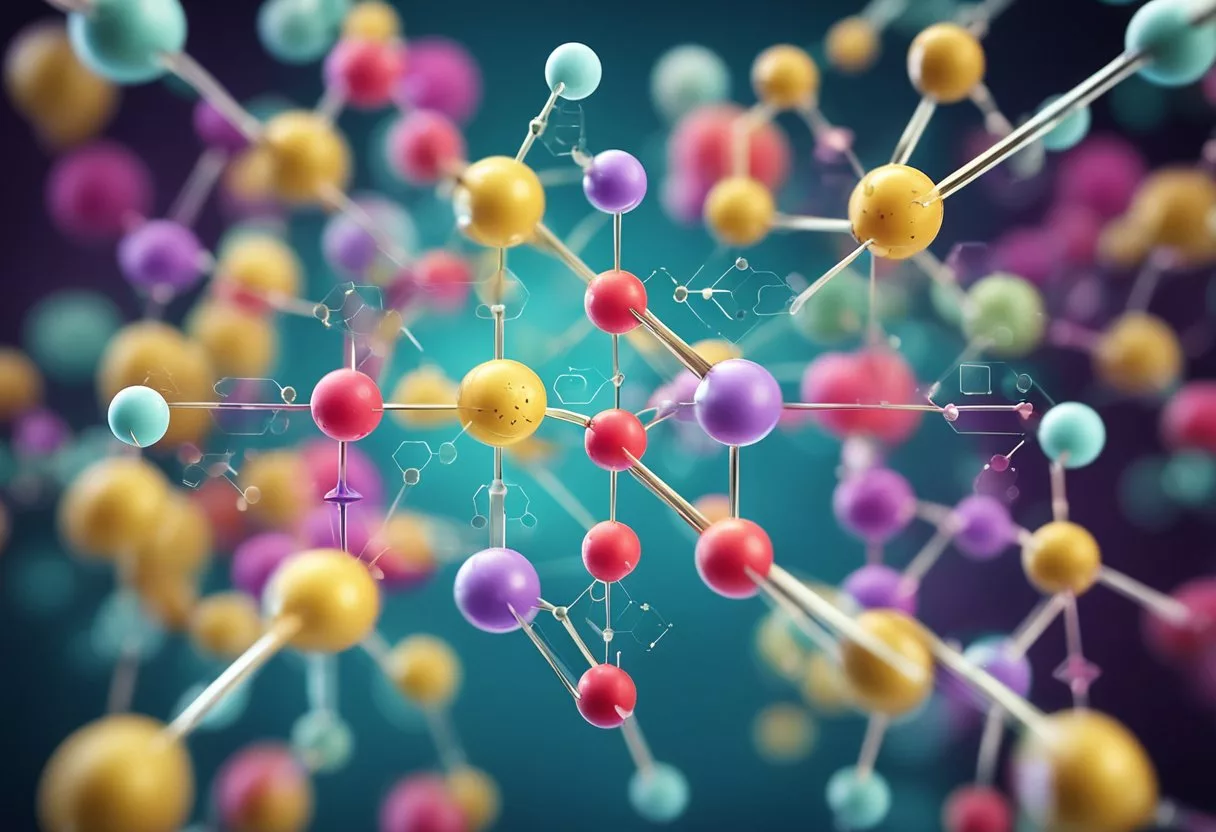
Methylation serves as an essential biological switch that controls several mechanisms in the human genome. This section delves into the chemistry and biological implications of methylation processes, particularly DNA methylation.
What Is Methylation?
Methylation is the process by which methyl groups are added to molecules. In biology, it most commonly refers to the addition of a methyl group to the fifth carbon atom of cytosine—a process known as 5-methylcytosine (5mC) formation. This is a key epigenetic mechanism; it is carried out by enzymes known as DNA methyltransferases.
DNA Methylation involves the modification of DNA, without changing the sequence, to regulate gene expression. The attachment of a methyl group to DNA, typically at the cytosine base within a cytosine-guanine dinucleotide (CpG site), is a well-recognized epigenetic mark.
Importance of Methylation in Biology
Methylation plays a pivotal role in biology. It is central to epigenetics, which refers to heritable changes in gene function that do not involve alterations in the DNA sequence. Methylation patterns influence gene expression by modifying the accessibility of genes to the cell’s transcription machinery.
- Gene Expression Regulation: Methylation can silence genes when located in gene promoter regions.
- Development and Differentiation: It is crucial for normal development and is involved in processes such as X-chromosome inactivation.
- Epigenetic Memory: Methylation forms part of the epigenomic landscape, which provides a cellular memory that affects the active and inactive states of genes.
Evidence shows that methylation patterns can be inherited and that dietary and environmental factors can influence these patterns. The derivative 5-hydroxymethylcytosine (5hmC) is considered an intermediate in DNA demethylation, further indicating a dynamic regulation of methylation states in cells.
Nutritional Influence on Methylation

Methylation processes in the human body are highly influenced by nutritional intake, particularly the availability of micronutrients that act as methyl donors and cofactors in one-carbon metabolism. This underscores the importance of diet in modulating epigenetic markers.
Role of Nutrients in Methylation
Micronutrients like folate, betaine, and choline are crucial in the methylation pathways.
Folate, or vitamin B9, is essential for the generation of S-adenosylmethionine (SAM), a primary methyl donor in the body. Sources rich in folate include leafy green vegetables, legumes, and fortified foods.
Choline, which can be obtained from eggs, lean meats, and fish, is another significant methyl donor. It contributes not only to the methylation cycle but also to liver function and brain development.
Betaine, a compound found in foods like beets, spinach, and whole grains, also plays a role in methylation by donating a methyl group to homocysteine, thus facilitating its conversion back to methionine, part of the critical methylation process.
Zinc, a trace mineral found in a variety of foods including meat, seeds, and nuts, acts as a cofactor for DNA methyltransferases, enzymes that are directly involved in DNA methylation. Adequate zinc levels are therefore necessary for proper maintenance of DNA methylation patterns.
In the context of one-carbon metabolism, which is a network of biochemical reactions involving the transfer of one-carbon units across different metabolic paths, these nutrients ensure proper flow and balance, crucial for DNA synthesis and repair as well as for the methylation of DNA, proteins, and lipids.
Methylation Cofactors and Compounds
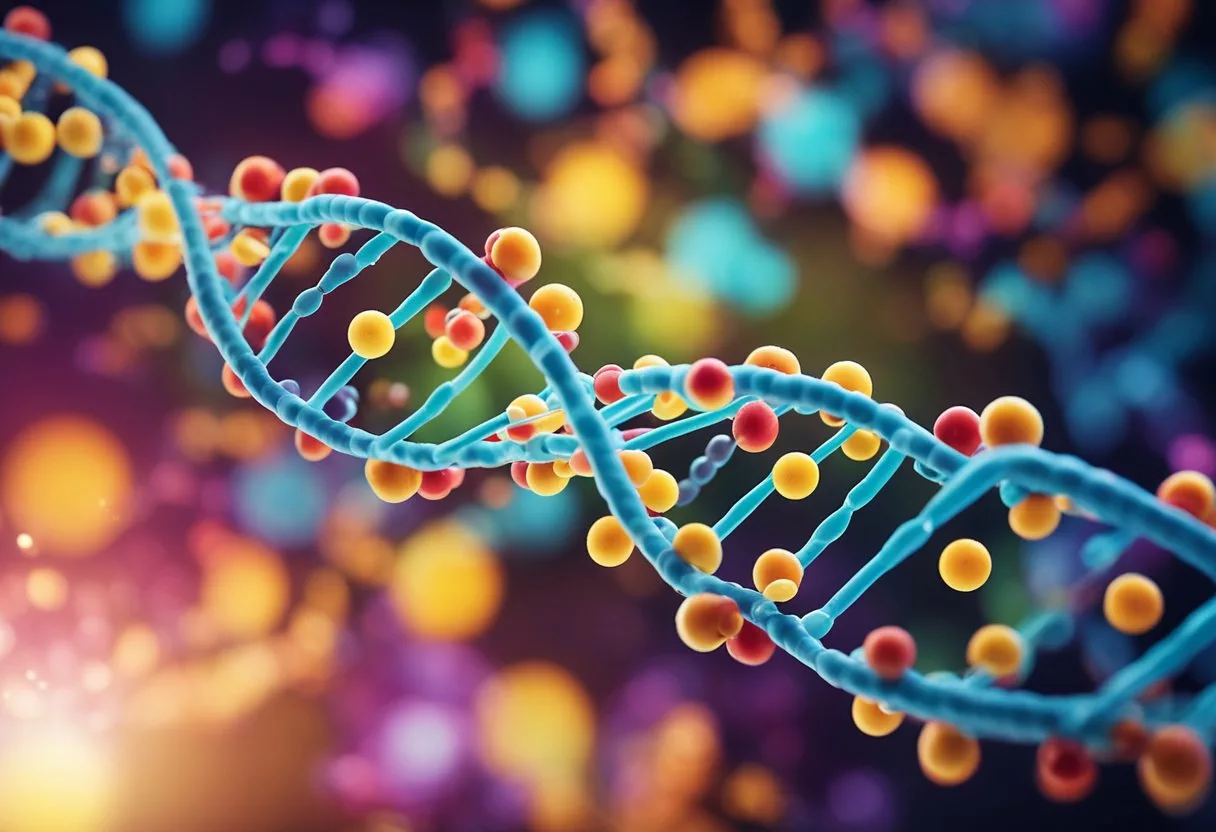
Methylation processes in the body rely on a variety of cofactors and compounds. These key players ensure the transfer of methyl groups necessary for regulating gene expression and maintaining cellular function.
Folate and Methylation
Folate, a B-vitamin, plays a crucial role in DNA methylation by acting as a donor of methyl groups. It is involved in the synthesis of S-adenosylmethionine (SAM), the primary methyl donor in the body. Adequate intake of folate ensures the proper functioning of methylation pathways and is crucial for genetic and cellular health.
Betaine and Methylation
Betaine serves as an alternative source of methyl groups. It participates in the methionine-homocysteine cycle by donating a methyl group to homocysteine, converting it back into methionine, a process regulated by the enzyme betaine-homocysteine s-methyltransferase. This helps maintain a normal level of homocysteine, an essential part of the methylation cycle.
Choline as a Methyl Donor
Choline is a critical component in methylation, where it acts as a precursor to betaine. As a methyl donor, choline contributes to the methylation process by ensuring a steady supply of betaine, which in turn influences DNA methylation and gene expression.
SAM and Methylation
S-adenosylmethionine, or SAM, is recognized as the universal methyl group donor involved in almost all methylation reactions within the body. The availability of SAM is dependent on the methionine-homocysteine cycle and the presence of requisite cofactors like folate and vitamin B12.
Homocysteine Metabolism
Homocysteine metabolism is tightly intertwined with methylation. An increase in homocysteine levels can indicate disruptions in the methylation cycle. Proper levels of homocysteine are maintained through methylation reactions involving SAM, where homocysteine is remethylated to methionine, highlighting the importance of a balanced intake of cofactors and methyl donors.
Methyltransferase Enzymes and Reactions

Methyltransferase enzymes are crucial in the process of DNA methylation, significantly influencing gene expression and cellular function. These enzymes catalyze the transfer of methyl groups to various substrates, working with a high level of precision within epigenetic regulatory mechanisms.
The Role of Methyltransferase Enzymes
Methyltransferase enzymes play a pivotal role in epigenetic modulation by adding methyl groups primarily to DNA and proteins. This action can affect gene expression without altering the DNA sequence.
DNA methyltransferases (DNMTs) are a specific class that target cytosine bases in DNA, leading to the silencing of genes when methyl groups are added.
Histone methyltransferases (HMTs), on the other hand, modify histones, which can either activate or repress transcription depending on the specific amino acids that are methylated and the context of these modifications.
These enzymes depend on S-adenosylmethionine (SAM) as a methyl donor to carry out their function. During the reaction, the enzyme facilitates the transfer of a methyl group from SAM to the target molecule.
Post-methylation, the by-product S-adenosylhomocysteine (SAH) is formed, which can act as an inhibitor of methylation reactions if not properly cleared from the reaction environment. The balance and availability of SAM and SAH are critical to the proper function of methyltransferase enzymes.
Epigenetics and Gene Regulation
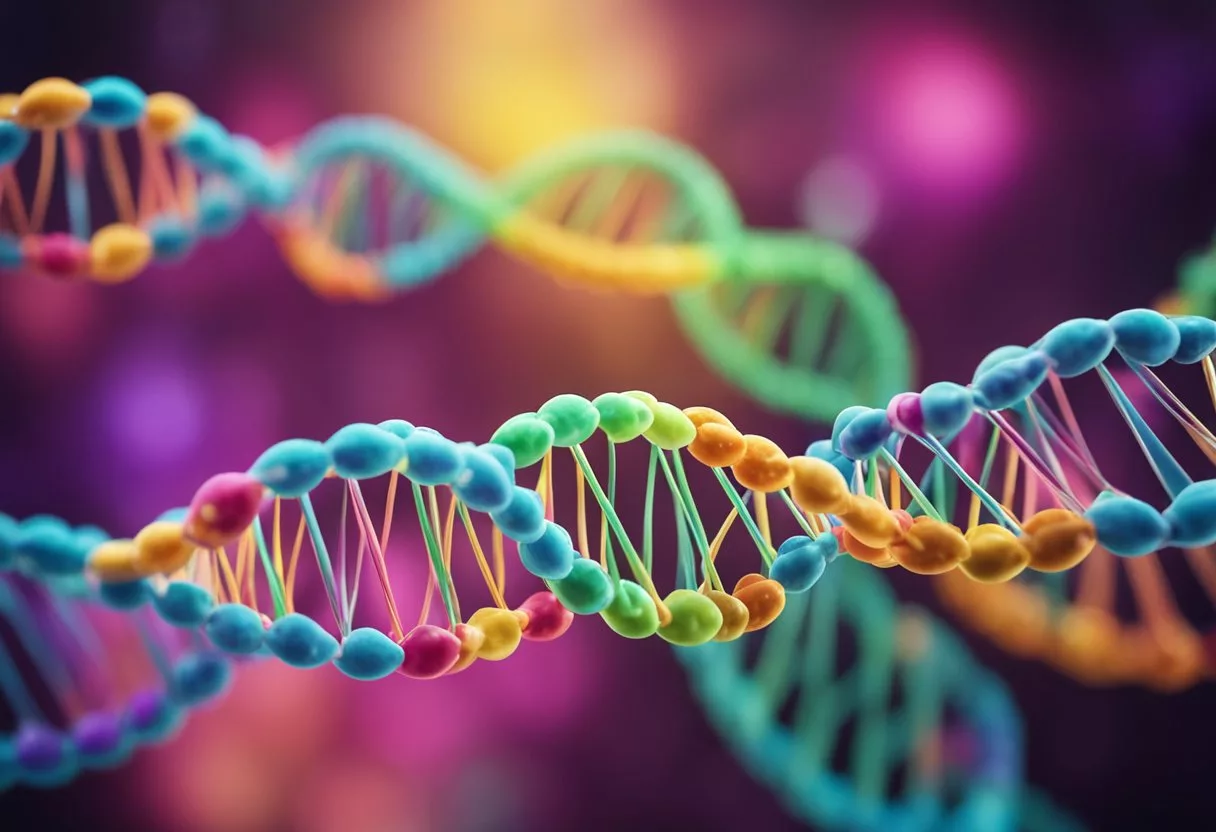
The interplay between epigenetics and gene expression is a fundamental aspect of biological function, with epigenetic mechanisms like DNA methylation influencing the activity of genes without altering the DNA sequence itself.
Epigenetic Mechanisms and Gene Expression
Epigenetic mechanisms are biological processes that result in the modification of gene activity without changing the DNA sequence. These mechanisms include DNA methylation, the addition of methyl groups to the cytosine nucleotides in DNA, and histone modification, among others.
In particular, methylation typically acts to repress gene expression when it occurs at gene promoters.
Key in this process is the enzyme DNA methyltransferase, which catalyzes the transfer of a methyl group to cytosine, forming 5-methylcytosine. This process effectively can turn genes off and is essential for epigenetic gene regulation.
Moreover, it’s been observed that diet and environmental factors can influence an individual’s epigenetic profile, ultimately affecting gene expression and health.
Impact of Methylation on Epigenetics
DNA methylation plays a pivotal role in epigenetics, serving as a control point for whether genes are active or silent.
Methylation patterns on DNA are heritable when cells divide; however, they can also change in response to environmental influences and are thus dynamic.
The addition of methyl groups to specific locations on a gene’s promoter region—commonly in a CpG dinucleotide context—can lead to chromatin remodeling. This often renders the associated DNA inaccessible to transcription factors, hence decreasing gene expression.
Conversely, DNA demethylation, the removal of these methyl groups, typically has the opposite effect, leading to an increase in gene expression.
These epigenetic modifications have been implicated in a variety of normal developmental processes, as well as in diseases like cancer. Understanding the precise mechanisms by which methylation affects the epigenome continues to be a crucial area of research, providing insights into how one’s environment and lifestyle can have long-term impacts on gene regulation and health.
Nutrigenetics and Personalized Nutrition
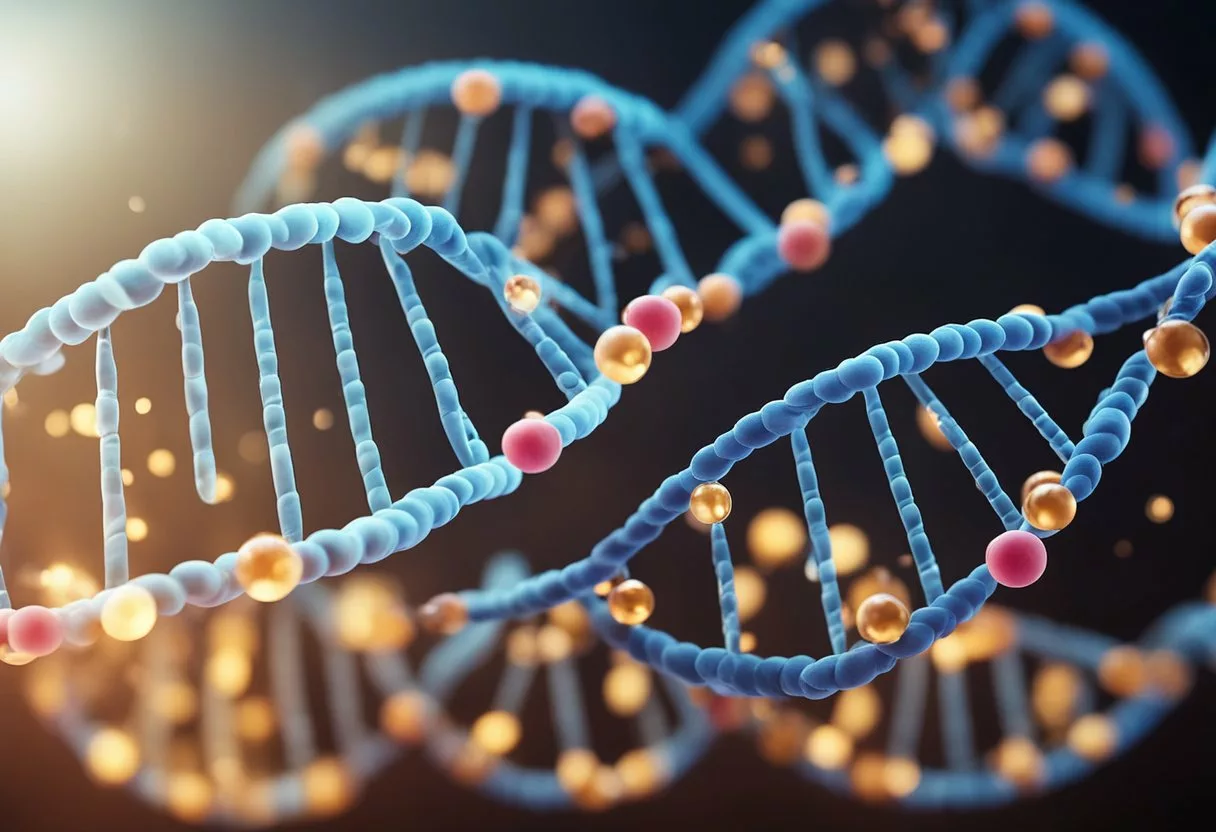
Nutrigenetics is a scientific discipline that examines how individual genetic makeup affects a person’s response to nutrients. Through understanding genetic variability, personalized nutrition plans can be tailored to an individual’s unique needs, potentially optimizing health outcomes.
Influence of Genetic Variability
Genetic variability plays a significant role in the way individuals metabolize nutrients and responds to dietary changes. Polymorphisms—variations in DNA sequence between individuals—are key to the principles of nutrigenetics.
They are often responsible for the differences in nutrient absorption, metabolism, and even the risk of developing certain diseases.
Certain polymorphisms may result in a mutation that influences gene expression and enzyme activity related to metabolism.
For instance, a single nucleotide polymorphism (SNP) in the MTHFR gene can lead to less efficient processing of folate, which is critical for processes like DNA synthesis and repair, as well as methylation—a chemical reaction crucial for many bodily functions.
By studying these variations, researchers have begun to understand how diet can “speak” to an individual’s genetic code, influencing which genes are turned on or off.
This knowledge enables the creation of personalized dietary recommendations that can support proper gene expression and promote better health.
These recommendations are at the heart of personalized nutrition, which aims to transcend one-size-fits-all dietary guidelines in favor of recommendations that are specifically designed for an individual’s genetic makeup.
Health Implications of Methylation
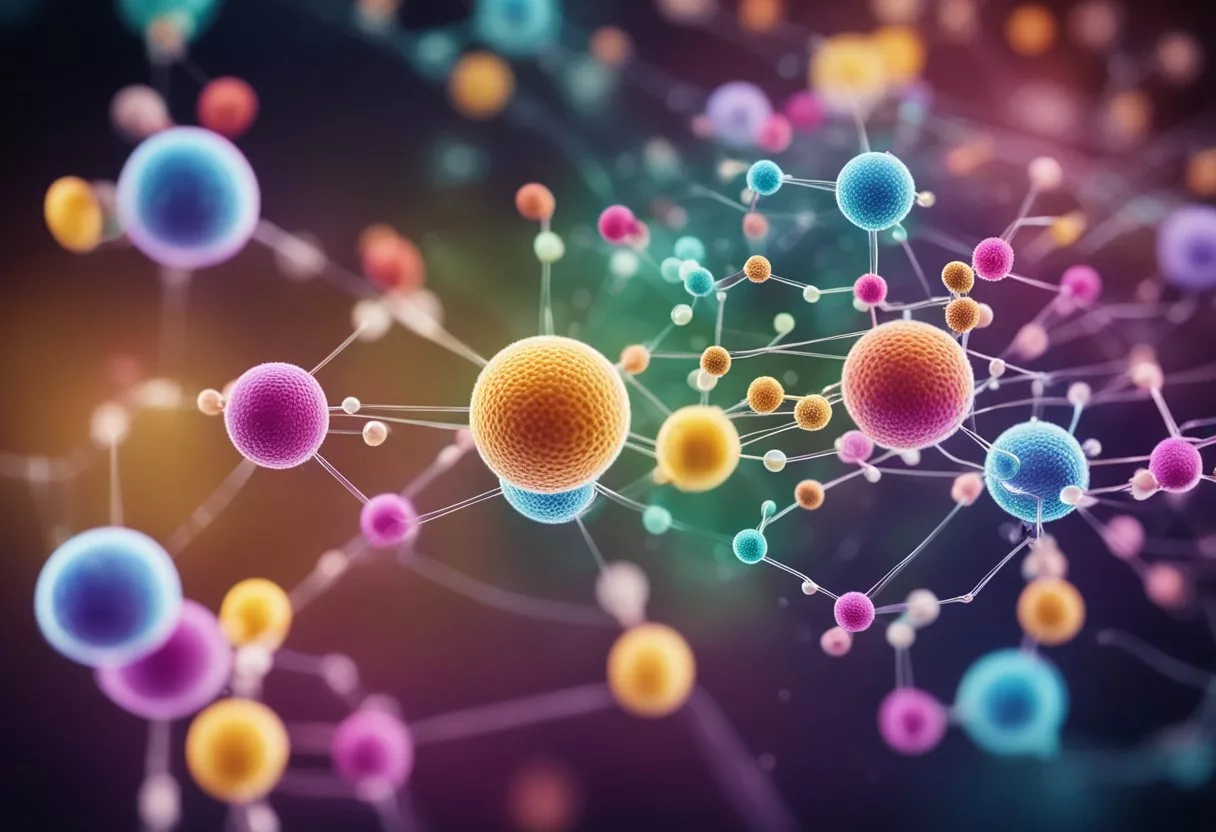
DNA methylation plays a crucial role in regulating gene expression and maintaining cellular function. Alterations in the methylation process can lead to a variety of health issues, including developmental disorders and increased disease risk.
Methylation Disorders
Hypomethylation of DNA is linked to several genetic disorders that disrupt normal development and function.
For instance, ICF syndrome, characterized by immunodeficiency, centromeric instability, and facial anomalies, arises due to mutations affecting DNA methyltransferase genes, leading to global methylation loss. Methylation disorders may also manifest as rare conditions involving methyl group metabolism, impacting neurological and physical development.
Methylation and Disease Risk
The one-carbon metabolism pathway is essential for providing methyl groups for methylation processes.
Dietary components that contribute to this pathway can influence disease risk.
Nutrients like folate and choline are vital for the production of S-adenosylmethionine (SAM), a critical methyl donor.
Nutritional imbalances may result in aberrant DNA methylation, which is implicated in various diseases, including cardiovascular diseases and type 2 diabetes.
Associations with Cancer
Methylation patterns are notably altered in cancerous cells.
Hypomethylation can lead to genome instability and overexpression of oncogenes.
For example, in breast cancer, altered methylation of specific genes like BRCA1 plays a role in tumorigenesis.
Studies have revealed how diet influences the methylation of DNA and thereby the expression of genes related to cancer.
Understanding these mechanisms assists in recognizing the importance of methylation in cancer risk and developing potential epigenetic therapies.
Environmental Effects on Methylation

Methylation, an essential epigenetic mechanism, is influenced by environmental factors like diet, famine, and stress. These effects can have significant implications on an individual’s health and development.
Impact of Famine and Stress
Famine: During severe shortages of food, the body’s nutritional intake is compromised, which can lead to alterations in DNA methylation.
An individual’s early development is especially sensitive to these changes. For example, nutritional deficiencies during pregnancy can provoke long-lasting modifications in the methylation pattern of the DNA of the offspring. These changes have the potential to affect gene expression and could result in health issues persisting throughout life.
Stress: Emotional and physical stressors can also impact methylation processes.
Chronic stress can influence the methylation of genes associated with the hypothalamic-pituitary-adrenal (HPA) axis, which regulates the stress response.
Additionally, stress experienced during critical periods of development, such as childhood or adolescence, may result in enduring epigenetic changes, affecting stress reactivity and mental health outcomes in later life.
- Environmental stressors, including famine and chronic stress, provoke alterations in DNA methylation.
- These changes can impact an individual’s growth, health, and susceptibility to diseases, emphasizing the importance of stable and supportive environments during critical developmental periods.
Methodologies for Studying Methylation in Nutrition

Investigations into how nutrition affects DNA methylation often utilize in vivo studies to understand the interconnected processes at work. Specifically, these studies focus on how dietary components influence one-carbon metabolism, which is intricately linked to methylation processes in the body.
In Vivo Studies of Methylation and Nutrition
In vivo studies represent a critical component of research into the relationship between nutrition and DNA methylation. These studies observe the effects of various nutrients on living organisms, often using animal models to extrapolate potential outcomes in humans.
One pivotal area of focus is one-carbon metabolism, a pathway crucial for the synthesis of S-adenosylmethionine (SAM), the primary methyl donor for DNA methylation reactions.
In vivo studies aim to uncover the dietary factors that modulate this pathway, in turn affecting DNA methylation patterns and potentially altering gene expression.
Researchers often adjust the levels of dietary methyl donors and nutrients involved in one-carbon metabolism, such as methionine, folate, and choline, in animal diets to observe changes in DNA methylation.
For instance, a study showed the impact of a diet deficient in methionine and choline on the DNA methylation status of the liver in mice, offering insights into the nutritional regulation of epigenetic modifications.
These methodologies in in vivo studies help to create a more complete picture of how diet can influence epigenetic mechanisms like methylation, shedding light on potential nutritional interventions for disease prevention and management.
Frequently Asked Questions
This section addresses some of the most common inquiries regarding how diet and lifestyle can influence methylation, a critical biological process affecting health.
What dietary changes can enhance methylation processes?
Individuals may enhance methylation processes by consuming foods rich in B vitamins, such as leafy greens, and avoiding excessive intake of alcohol and processed foods.
A balanced diet that includes specific nutrients can support proper methylation.
Which supplements are known to improve methylation efficiency?
Supplements that are known to improve methylation efficiency include those containing B vitamins like folate, B12, and B6.
It’s essential to consult with a healthcare provider before starting any supplement regimen to ensure proper dosages and suitability for individual health needs.
What are common signs of inadequate methylation?
Common signs of inadequate methylation can include fatigue, mood disturbances, and cognitive difficulties.
These symptoms may stem from a multitude of issues and should be evaluated by a healthcare professional for accurate diagnosis and treatment.
What role does DNA methylation play in overall health?
DNA methylation plays a pivotal role in gene expression regulation and cellular function.
Abnormal methylation patterns have been linked to various health disorders, including certain cancers, indicating its significance in overall health management.
What foods are rich in methyl donors for supporting methylation?
Foods rich in methyl donors include leafy green vegetables, eggs, legumes, and seeds.
These foods contribute essential compounds like folate and choline that are necessary for the methylation process.
How does lifestyle affect the body’s methylation pathways?
Lifestyle factors can significantly affect the body’s methylation pathways. Diet, exercise, stress, and sleep are a few examples.
Consistent healthy choices support optimal methylation. Meanwhile, negative habits like smoking and lack of physical activity can disrupt this complex process.